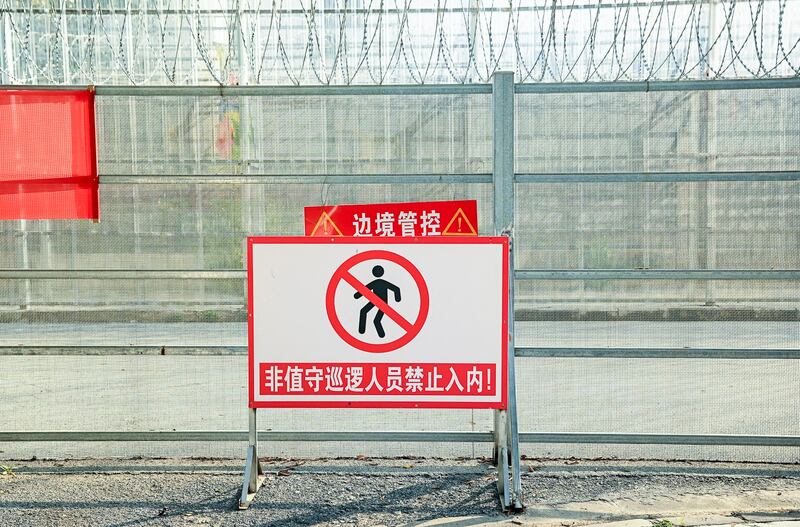China’s People’s Liberation Army kicked off a three-day joint air and ground military exercise along its southern border with Myanmar on Tuesday as part of what its defense ministry called a bid to shore up border security and stability.
The exercises come as an alliance of three rebel factions has pushed forces controlled by Myanmar’s ruling junta out of major towns in Shan state. Last week, the Kachin Independence Army, or KIA, took control of a strategically important township in neighboring Kachin state on the border with China.
The junta has responded with airstrikes that have unsettled Beijing, prompting China to fire warning shots at junta jets.
In a statement on Tuesday, China’s defense ministry said live-fire drills are being conducted in four locations outside of Ruili city in Yunnan province, along the border with Myanmar’s northern and eastern Shan state to test the military’s “multidimensional blockade and joint firepower strike” capabilities, as well to “maintain border security and stability.”
A Myanmar national working in Ruili, who like others interviewed for this report, spoke on condition of anonymity due to security concerns, told RFA Burmese that the Chinese army was patrolling with tanks and airplanes near the border.
"In the past, China hasn’t conducted military exercises in this area,” he said. “However, as the fighting in Myanmar has intensified, it has dispatched its troops along with its tanks. They are also conducting military exercises. Chinese helicopters are deployed, which has never been seen here before.”
KIA spokesperson Colonel Naw Bu told RFA that the assumption is China is conducting the exercise as a warning to both the junta troops and the armed opposition.
RELATED STORIES
[ China fires into Myanmar after junta airstrike on border, group saysOpens in new window ]
[ Fighting flares near state capital in north MyanmarOpens in new window ]
[ Northern Myanmar residents caught up in fighting, dozens hurtOpens in new window ]
He said he believes that Beijing is sending a message that it will "protect its people from artillery fire and ensure stability in its border area.”
In addition to the Aug. 15 junta airstrike on the headquarters of the KIA in Lai Zar, a junta artillery attack on KIA positions landed across the border in March.
‘A preemptive strike’
Hla Kyaw Zaw, an expert on China-Myanmar affairs, told RFA that China is conducting military exercises as a precaution due to the fierce fighting in Myanmar.
“They [Beijing] have said that they won’t tolerate either the junta or the ethnic armies causing any explosions in their country,” he said. “China calls it ‘a preemptive strike.’ This is a preventive measure and strategy, as the junta’s planes have occasionally entered their airspace.”

After the Three Brotherhood Alliance alliance of ethnic armies launched an offensive known as Operation 1027 against the junta in Shan state in late October, China held three military exercises along the border. Tuesday’s drills mark the fourth time it has done so.
When RFA contacted the Chinese Embassy in Myanmar for more information on the military exercises, a representative replied with an email quoting Tuesday’s statement by Senior Col. Tian Junli, the spokesman for the PLA’s Southern Theater Command, which said that the drills aim to test reconnaissance and early warning capabilities.
Additionally, the statement said, the exercises will test the PLA’s ability to respond to emergencies, “resolutely safeguarding national sovereignty, border stability, and the people’s lives and property.”
Preventing Western involvement
Than Soe Naing, a political commentator, suggested that China has been conducting frequent military exercises to “prevent the possible involvement of western nations in Myanmar's conflict.”
After the first wave of Operation 1027, ethnic army representatives held a meeting with the former Counselor of the U.S. Department of State Derek Chollet on March 28, and with the current counselor, Tom Sullivan, on Aug. 15.
China’s exercises also follow a meeting between Chinese Foreign Minister Wang Yi and junta chief Senior General Min Aung Hlaing in Myanmar’s capital Naypyidaw on Aug. 14.
In a statement following that meeting, China's Ministry of Foreign Affairs said that Beijing supports Myanmar’s independence, sovereignty, political reconciliation and democratic transitions. It also said that China opposes instability and armed conflicts, as well as interference by foreign countries.
Translated by Aung Naing. Edited by Joshua Lipes and Malcolm Foster.

